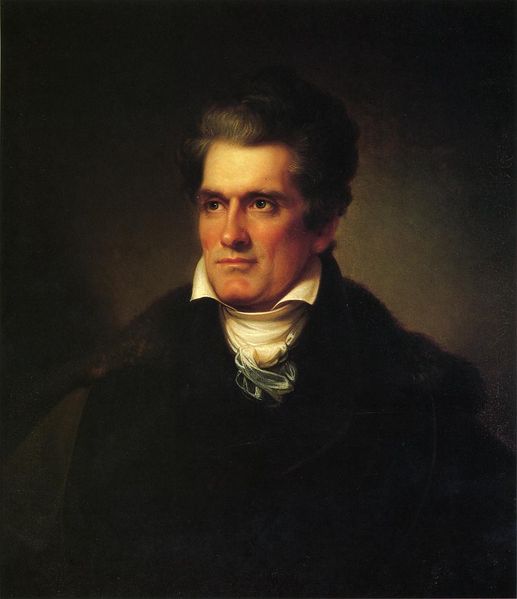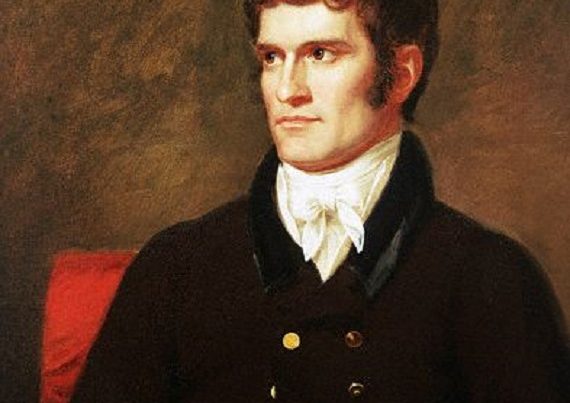But I oppose war, not simply on the patriotic ground of a citizen looking to the freedom and prosperity of his own country, but on still broader grounds, as a friend of improvement, civilization and progress. Viewed in reference to them, at no period has it ever been so desirable to preserve the general peace which now blesses the world. Never in its history has a period occurred so remarkable as that which has elapsed since the termination of the great war in Europe, with the Battle of Waterloo, for the great advances made in all these particulars. Chemical and mechanical discoveries and inventions have multiplied beyond all former example, adding, with their advance, to the comforts of life in a degree far greater and more universal than all that was ever known before. Civilization has, during the same period, spread its influence far and wide, and the general progress in knowledge, and its diffusion through all ranks of society, has outstripped all that has ever gone before it. The two great agents of the physical world have become subject to the will of man, and have been made subservient to his wants and enjoyments; I allude to steam and electricity, under whatever name the latter may be called. The former has overcome distance, both on land and water, to an extent which former generations had not the least conception was possible. It has, in effect, reduced the Atlantic to half its former width, while, at the same time, it has added threefold to the rapidity of intercourse by land. Within the same period, electricity, the greatest and most diffuse of all known physical agents, has been made the instrument for the transmission of thought—I will not say with the rapidity of lightning, but by lightning itself. Magic wires are stretching themselves in all directions over the earth; and when their mystic meshes shall have been united and perfected, our globe itself will become endowed with sensitiveness, so that whatever touches on any one point will be instantly felt on every other. All these improvements, all this increasing civilization, all the progress now making, would be in a great measure arrested by a war between us and Great Britain. As great as it is, it is but the commencement—the dawn of a new civilization, more refined, more elevated, more intellectual, more moral, than the present and all preceding it. Shall it be we who shall incur the high responsibility of retarding its advance, and by such a war as this would be?
I am, in this connection, opposed to war between the United States and Great Britain. They are the two countries furtherest in advance in this great career of improvement and amelioration of the condition of our race. They are, besides, the two most commercial, and are diffusing, by their widely extended commerce, their blessings over the whole globe. We have been raised up by Providence for these great and noble purposes, and I trust we shall not fail to fulfil our high destiny. I am, besides, especially opposed to war with England at this time, because I hold that it is now to be decided whether we are to exist in future as friends or enemies. War, at this time, and for this cause, would decide supremacy; we shall hereafter stand in the attitude of enemies. It would give birth to a struggle in which one or the other would have to succumb before it terminated, and which, at the end, might prove ruinous to both. On the contrary, if war can be avoided, powerful causes are now in operation, calculated to cement and secure a lasting—I hope a perpetual—peace between the two countries, by breaking down the barriers which impede their commerce, and thereby uniting them more closely by a vastly enlarged commercial intercourse, equally beneficial to both. If we should now succeed in setting the example of free trade between us, it would force all other civilized countries to follow it in the end. The consequence would be to diffuse a prosperity greater and more universal than can be well conceived, and to unite by bonds of mutual interest the people of all countries. But in advocating the cause of free trade, I am actuated not less by the political consequences likely to flow from it than the advantages to be derived from it in an economical point of view. I regard it in the dispensation of Providence as one of the great means of ushering in the happy period foretold by inspired prophets and poets when war should be no more.
I am finally opposed to war because peace—peace is preeminently our policy. There may be nations, restricted to small territories, hemmed in on all sides, so situated that war may be necessary to their greatness. Such is not our case. Providence has given us an inheritance stretching across the entire continent, from east to west, from ocean to ocean, and from north to south, covering by far the greater and better part of its temperate zone. It comprises a region not only of vast extent, but abundant in all resources; excellent in climate; fertile and exuberant in soil; capable of sustaining, in the plentiful enjoyment of all the necessaries of life, a population of ten times our present number. Our great mission, as a people, is to occupy this vast domain; to replenish it with an intelligent, virtuous and industrious population; to convert the forests into cultivated fields; to drain the swamps and morasses, and cover them with rich harvests; to build up cities, towns and villages in every direction, and to unite the whole by the most rapid intercourse between all the parts. War would but impede the fulfilment of this high mission, by absorbing the means and diverting the energies which should be devoted to the purpose. On the contrary, secure peace, and time, under the guidance of a sagacious and cautious policy, “a wise and masterly inactivity,” will speedily accomplish the whole. I venture to say “a wise and masterly inactivity” in despite of the attempt to cast ridicule upon the expression. Those who have made the attempt would seem to confound such inactivity with mere inaction. Nothing can be more unlike. They are as wide apart as the poles. The one is the offspring of indolence, or ignorance, or indifference. The other is the result of the profoundest sagacity and wisdom—a sagacity which looks into the operations of the great causes in the physical, moral and political world; which, by their incessant operation, are ever changing the condition of nations for good or evil; and wisdom, which knows how to use and direct them when acting favorably, by slight touches, to facilitate their progress, and by removing impediments which might thwart or impede their course—and, not least, to wait patiently for the fruits of their operation. He who does not understand the difference between such inactivity and mere inaction—the doing of nothing—is still in the hornbook of politics, without a glimpse of those higher elements of statesmanship by which a country is elevated to greatness and prosperity. Time is operating in our favor with a power never before exerted in favor of any other people. It is our great friend, and under the guidance of such a policy it will accomplish all that we can desire. Our population is now increasing at the rate of about 600,000 annually, and is progressing with increased rapidity every year. It will average, if not impeded, nearly a million during the next twenty-five years, at the end of which period our population ought to reach to upwards of forty millions. With this vast increase, it is rolling westwardly with a strong and deep current, and will, by the end of that period, have spread from ocean to ocean. Its course is irresistible. The coast of the Pacific will then be probably as densely populated, and as thickly studded with towns and villages, in proportion to its capacity to sustain population, as that of the Atlantic now is. At the same rate, we shall have increased to upwards of eighty millions of people at the end of another twenty-five years, when, with one foot on the Atlantic and the other on the Pacific, and occupying a position between the eastern and the western coasts of the old continent, we shall be better able to control the commerce of both oceans, and to exert an influence over both continents, than any other country in the world. If we avoid war, and adhere to peace, all this will be effected—effected, I trust, without the loss of our free popular institutions. I am aware how difficult is the task to preserve free institutions over so wide a space and so immense a population; but we are blessed with a constitution admirably calculated to accomplish it. Its elastic power is unequaled, which is to be attributed to its federal character. The hope of success depends on preserving that feature in its full perfection, and adhering to peace as our policy. War may make us great; but let it never be forgotten that peace only can make us both great and free.







